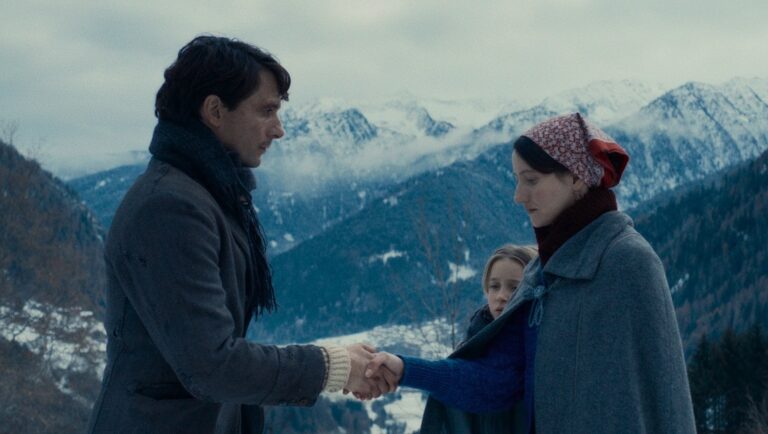The village schoolteacher, taciturn but possessed of intellectual passions, plays a newly delivered recording of Vivaldi’s “The Four Seasons” for his class, most of whom appear to be under the age of ten. He lectures his young students on the power of the composer’s work: “Each violin is a feeling. A wind. An animal. Four seasons. Four sonnets. Four concertos. One for each season.” This scene in writer-director Maura Delpero’s Vermiglio encompasses both the film’s physical and psychological landscape: in its isolated setting, the seasons structure and dictate the movements of its residents’ lives. Yet each of these individual lives have their own seasons, changing incrementally and internally, less visible than changes in weather, but equally impactful and equally inevitable.
Vermiglio’s title refers to the film’s setting, an Italian Alpine village. In the midst of World War II, the community shelters a Sicilian army deserter, Pietro (Giuseppe De Domenico), who rescued fellow soldier Attilio (Santiago Fondevila) from the German front and returned him to his family in the village. Lucia (Martina Scrinzi), the eldest daughter of the village’s schoolteacher Cesare (Tommasso Ragno), falls in love with Pietro, and they marry soon before the war’s long-awaited conclusion. What seems to be a time of contentment, though, is soon marred when Pietro’s postwar visit to Sicily incurs an unexpected twist of fate that permanently affects the lives of Lucia and her family.
While Lucia and Pietro’s relationship forms the narrative spine of Vermiglio, Delpero pays equal — and sometimes greater — attention to the small domestic dramas of Lucia’s family. Cesare and his wife Adele (Roberta Rovelli) have several children of varying ages in addition to Lucia; the size of the family shifts over the course of the film, as Adele loses a child in infancy and soon becomes pregnant again. Long-simmering tensions and personal pains within this family slowly rise to the foreground — Cesare’s disappointment in his oldest son Dino’s (Patrick Gardner) lack of academic capability, second-eldest daughter Ada’s (Rachele Potrich) private shame over her burgeoning sexuality and attraction to women, youngest daughter Flavia’s (Anna Thaler) intellectual promise, which leaves Ada feeling unexceptional in comparison. Delpero’s consistent and detailed attention to the development of these micro-dramas, alongside Lucia and Pietro’s story, results in a film that is not quite the turbulent romantic drama suggested by the core narrative, but instead a collective portrait of a family in flux.
Delpero’s narrative approach both tests and rewards patience. The marriage plot unfurls slowly and nearly recedes from view at points, the acting style Delpero cultivates in her ensemble is uniformly subtle and subtext-heavy, and the steadily accumulated character details and subplots may initially appear inessential and do not all resolve neatly. Yet this approach also allows one to gradually enter the lives of the film’s characters, coming to understand intimately their desires, frustrations, and, crucially, the daily structures of their lives, which are likely unfamiliar to contemporary audiences. The film’s aesthetic — while similarly austere in Delpero’s penchant for long takes and relatively static compositions, and director of photography Mikhail Krichman’s muted color palate dominated by cool white and ice blue — does provide a notable counterbalance to those who may feel still dissatisfied by the film’s narrative restraint. The screen is perpetually awash in natural beauty, with Delpero and Krichman capturing snow-capped mountains and picturesque fir forests in reverent wide shots. The visual emphasis on Vermiglio’s vistas is all the more notable when contrasted with the domestic scenes, where people are cluttered in rooms almost too small to hold them.
By the film’s conclusion, an attentive viewer will understand not only how the characters and their circumstances are changed, but how these changes emerged from their lives’ everyday texture. They, too, will understand the full scope, and the contradictory vastness and constraints, of the physical world they inhabit. There is perhaps a missed opportunity for Delpero to provide more space for her characters’ raw passions — the sexual charge between Lucia and Pietro is only gestured at, for instance, when the viewer might understand Lucia better by experiencing the relationship’s ecstatic peaks alongside her — but ultimately, Delpero’s restrained, yet intimate narrative and aesthetic approach succeeds on its own terms. By drawing the viewer in by degrees, Delpero effectively immerses them in a time and place, rendered with detail and care, that would otherwise remain remote.
DIRECTOR: Maura Delpero; CAST: Martina Scrinzi, Tomasso Ragno, Santiago Fondevila, Giuseppe De Domenico, Carlotta Gamba; DISTRIBUTOR: December 25; IN THEATERS: Sideshow/Janus Films; RUNTIME: 1 hr. 59 min.


Comments are closed.